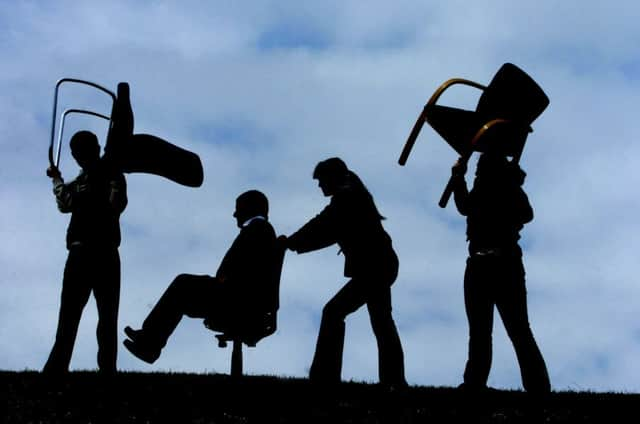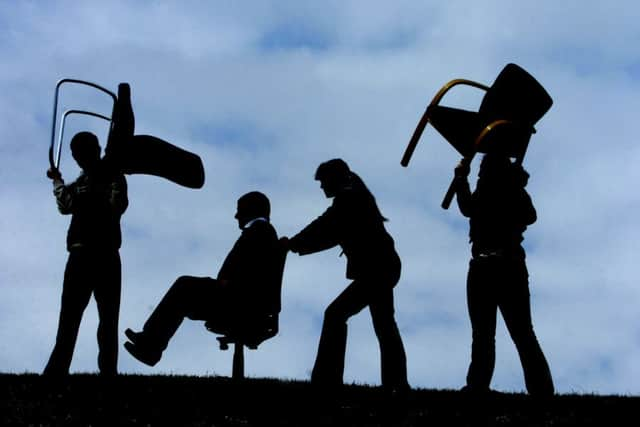Thrifty habits of our forefathers key to reducing waste


According to a major new Scottish Government campaign aimed at encouraging everyone to rethink how green we could be, we need to start consuming less and using more of what we already own.
It says every little bit we do as individuals, together makes a giant impact on Scotland’s waste.
Advertisement
Hide AdAdvertisement
Hide AdAnd even small changes go towards helping the nation hit ambitious greenhouse gas targets. But with our recycling bins bulging and our food waste bins already stuffed, how much more can each of us really do? According to Zero Waste Scotland, we send many items to the dump which could easily be put to good use and not only benefit the environment but boost the economy.


“Thousands of re-usable items are sent to landfill every year, including 12,800 tonnes of sofas and 9,800 tonnes of washing machines,” says Iain Gulland, chief executive of Zero Waste Scotland.
“There is a market – research shows 83 per cent of people in Scotland would be happy to buy second hand goods.
“We are already re-using some items and the economic and environmental benefits of increasing this are clear. Currently, 17 per cent of all sofas are re-used, generating £1.5m in sales and jobs, saving 4,500 tons of C02 and having a positive impact on low income families.
“A thriving re-use and repair sector has to be a major part of the Scottish economy in the future, as pressure on resources increase.”
Scotland generates around 11.4million tonnes of waste a year, of which nearly 4.5m tonnes ends up in landfill sites. Around 1.3m tonnes is from Scottish households.
At Edinburgh-based charity Fresh Start, donated items like soft furnishings, kitchenware and bedding are turned into starter packs for homeless people as they move into a new home.
Working alongside Bethany Christian Trust, it has helped more than 2,000 Edinburgh families towards a new life.
Advertisement
Hide AdAdvertisement
Hide AdAnother organisation, Four Square, runs the Edinburgh Furniture Initiative (EFI) which sells pre-loved items which funds projects to help people into work and others with housing problems.
“People realise they can get great quality furniture for much less than buying it new. Some of the items we receive are just a few months old,” says general manager Matt Lopata.
Hanna Plant, waste prevention co-ordinator at environmental charity Changeworks says, “We recommend people look up local reuse projects, charity shops, community groups and community recycling centres.
“Householders can drop off furniture at Edinburgh’s Seafield Community Recycling Centre and local charities collect the items to sell in their shops.
“There are online tools to help, such as Changeworks Edinburgh Charity Shop and Reuse Map and Too Good to Waste, an A-Z guide to reusing and recycling in Edinburgh and the Lothians.”
For those who want to mend what they have rather than replacing it, a lack of skills could be an issue. However at Remade in Edinburgh, skills training in everything from sewing to computer repairs are being passed to a new generation.
“I think the message is getting through to people,” says Amanda Blackadder of Remade. “A lot of focus has been on recycling items. “Now it’s turning towards repairing what we have.
“People come both because they don’t want to continue with this consumer lifestyle and also because they have items they love and simply want to keep using.”
Advertisement
Hide AdAdvertisement
Hide AdCase study: Davie Dickson
Davie Dickson, 65, is retired and lives with his wife Mhairi, 57, in a three-bedroom terraced house in Macmerry, East Lothian.
They come from a generation which made the most of everything they had which means Davie and Mhairi are already doing a lot to help protect the environment without thinking.
They take care with their food shopping, try to keep down the waste and even reuse items which might in days gone by just gone straight into the bin, turning them into not only green but useful items.
“Mhairi likes to makes quilts,” says Davie. “She takes the grandchildren’s old clothes, cuts them into squares and makes ‘memory quilts’.
“So clothes aren’t just being thrown out, they’re being reused as something else.”
While Mhairi’s idea gives new life to old clothes, Davie has made use of the local second hand dealer to buy a desk which he revamped to create a new sewing table.
As a regular at Macmerry Men’s Shed – a club for men who want to practise old trades and learn new skills – he turns previously unwanted scraps of wood into anything from candlesticks to bird boxes.
Advertisement
Hide AdAdvertisement
Hide AdWhile their handiwork keeps them busy, it also helps keep in check part of Scotland’s staggering waste record. “A lot of what we do comes naturally,” says Davie, a retired butcher who has a shrewd sense of portion sizes, seasonal products and, crucially, how to cook so nothing goes to waste.
“It’s the way we were raised,” he adds. “You use what you have and don’t throw things out unless there’s no choice.”
Sometimes, though, even he is defeated. Especially when confronted with mountains of packaging wrapped around everything from cabbage bought for the Sunday roast, to his wife’s yoghurt desserts in individual pots.
And while he’s not one for checking food miles, he hopes it’s a problem that balances out: “I’ll buy bananas from Colombia and mushrooms from a farm near North Berwick. I’m more likely to look at the price than where something is from.
“We use up any leftovers but you can only eat so much cabbage in one week and there’s just the two of us. Any scraps like peelings go into the food waste bin.”
Davie drives the couple’s 15 year old Suzuki Liana 1600 to Lidl in Musselburgh for the weekly shop. It’s a 15 mile round trip, but even though other shops are closer, they prefer what’s on offer.
“Mhairi works at a pharmacy and takes the bus and I drive pretty much every day. It’s not practical to go by bus when you’ve loads of shopping, so I’m not likely to give up the car.
“I wouldn’t consider an electric car. Where would you plug it in for a start?”
Advertisement
Hide AdAdvertisement
Hide AdThey are also reluctant to give up two foreign holidays a year, usually flying to Portugal or Madeira.
Their terraced home has just had external insulation fitted thanks to grants which cut the cost from £11,500 to just £500. Their loft insulation came free when it was fitted a few years ago.
But while Davie knows the nightly routine of putting the dinner plates into the dishwasher for a full cycle may not be the best option, it’s a time saving ‘must’ that he doesn’t want to scrap.
“I don’t feel the economy wash cleans the dishes very well. I don’t think I’d change that.
“My wife waits until there’s a full load of laundry for the washing machine then she puts it on a proper long wash. She doesn’t really trust the economy or colder wash to get everything done properly.”
While they do their best to recycle their waste into the right bins, Davie says he and his elderly neighbours are no fans of the roadside clutter it creates. “It’s like an obstacle course trying to get down the street. That makes people annoyed and fed up with all this recycling.”
• Make Scotland Greener is a partnership between The Scotsman and the Scottish Government which provides practical ways for families to be more environmentally friendly